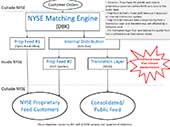SEC Charges New York Stock Exchange for Improper Distribution of Market Data
Washington, D.C., Sept. 14, 2012 —
The Securities and Exchange Commission today brought first-of-its-kind charges against the New York Stock Exchange for compliance failures that gave certain customers an improper head start on trading information.
SEC Regulation NMS (National Market System) prohibits the practice of improperly sending market data to proprietary customers before sending that data to be included in what are known as consolidated feeds, which broadly distribute trade and quote data to the public. This ensures the public has fair access to current market information about the best displayed prices for stocks and trades that have occurred.
According to the SEC's order against NYSE, the exchange violated this rule over an extended period of time beginning in 2008 by sending data through two of its proprietary feeds before sending data to the consolidated feeds. NYSE's inadequate compliance efforts failed to monitor the speed of its proprietary feeds compared to its data transmission to the consolidated feeds.
NYSE and its parent company NYSE Euronext agreed to a $5 million penalty and significant undertakings to settle the SEC's charges. It marks the first-ever SEC financial penalty against an exchange.
"Improper early access to market data, even measured in milliseconds, can in today's markets be a real and substantial advantage that disproportionately disadvantages retail and long-term investors," said Robert Khuzami, Director of the SEC's Division of Enforcement. "That is why SEC rules mandate that exchanges give the public fair access to basic market data. Compliance with these rules is especially important given exchanges' for-profit business interests"
Daniel M. Hawke, Chief of the SEC Enforcement Division's Market Abuse Unit, added, "The violations at NYSE may have been technological, but they were not technical. Robust technology governance is just as important to preventing investor harm as any other compliance or supervisory function."
Robert W. Cook, Director of the SEC's Division of Trading and Markets, said, "Market data is the lifeblood of the national market system. Our rules require exchanges to distribute information on quotes and trades to the consolidated data processors on terms that are 'fair and reasonable' and 'not unreasonably discriminatory.'"
According to the SEC's order, NYSE violated Rule 603(a) of SEC Regulation NMS. The two NYSE proprietary data feeds at issue were Open Book Ultra — which sends real-time data about NYSE's entire order book — and PDP Quotes, which contains NYSE's quote for each security. The transmission disparities had several causes. An internal NYSE system architecture gave one of the data feeds a faster path to customers than the path used to send data to the consolidated feed. Also there was a software issue in the internal NYSE system that sent data to the consolidated feed. The disparities in data release times ranged from single-digit milliseconds to multiple seconds.
The SEC's order finds that NYSE's compliance department was not involved in important technology decisions, including the design, implementation, and operation of NYSE's market data systems. By not involving the compliance department at critical junctures, NYSE missed opportunities to avoid compliance failures. NYSE also failed to retain computer files that contained information about its transmission of market data, including the times that NYSE sent data to be included in the consolidated feed. These computer files related to NYSE's compliance with Rule 603(a), and NYSE's failure to retain them complicated its ability to determine when it experienced delays sending data and calculate the length of delays when they occurred.
The SEC's order finds that NYSE violated Rule 603(a) of Regulation NMS and the record retention provisions of Section 17(a)(1) of the Securities Exchange Act and Rule 17a-1, and NYSE Euronext, which supplied the personnel responsible for these systems and compliance, caused the violations. NYSE and NYSE Euronext agreed to a settlement without admitting or denying the Commission's findings. The order censures NYSE, imposes a $5 million penalty, and requires both NYSE and NYSE Euronext to cease and desist from committing or causing these violations. NYSE and NYSE Euronext are required to retain an independent consultant to conduct a comprehensive review of their market data delivery systems to ensure that they comply with Rule 603(a).
The SEC's investigation was conducted by members of the Enforcement Division's Market Abuse Unit including William Max Hathaway, David Herman, Ainsley Kerr, and Robert Cohen, and supervised by the unit's chief Daniel M. Hawke and deputy chief Sanjay Wadhwa.
###
Last Reviewed or Updated: July 28, 2014



